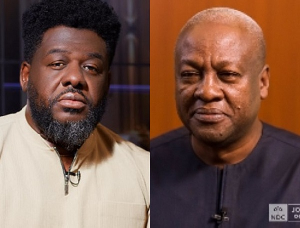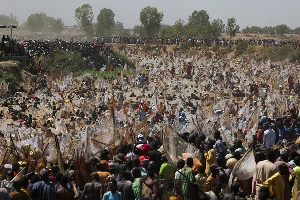The Deputy Executive Director of the Media Foundation for West Africa (MFWA), Mr Sulemana Braimah, has urged journalists to carry out their own research on the registration of voters in the country, instead of reporting on the opinions of politicians.
He said the public and other stake-holders, needed to know the facts on the progress of the exercise, adding that this could only be possible if journalists did unbiased research on the exercise, in order to come out with reports that reflected the situation on the ground.
Mr Braimah who was speaking during an interview on the conduct of journalists towards national cohesion and progress, said it was unfortunate, that some media discussions on the biometric registration exercise, centred on the opinions of politicians, as well as hear-say from others who did not necessarily seek to report the facts, but typically had propagandist objectives to fulfill.
Touching on complaints by some sections of the public about the misconduct of some media outfits, such as moderators allowing the use of insulting language during live talk shows, Mr Braimah said, “it is a question of going by the code of ethics that governs journalism in the country” adding that if journalists adhered to the terms spelt out in their code of ethics, their output would reflect a lot more professionalism, which would ultimately court the confidence and trust of the public.
“The challenges we face are as a result of several factors, such as inadequate training for journalists, societal values, the effectiveness of the National Media Commission (NMC) as well as the Ghana Journalists Association, and the managers of media institutions.”
On whether journalism in the country needed some sanctioning to ensure professionalism and accurate reportage, Mr Braimah said “there are sanctions. If you defame for example, you could be taken to court.”
The MFWA Deputy Executive Director said, he believed the NMC could be more efficient in ensuring that journalism practise in the country was typified by high ethical and professional conduct.
He said in cases of unethical conduct by media practitioners, the NMC had to be the first point of contact in seeking redress, adding that if this could be done effectively, “it could mitigate some of these problems.”
Mr Braimah described attacks on some media outfits and personnel by certain groups, in both recent and past times as most unfortunate saying, “acts of impunity should not at all be tolerated, where ever they come from.”
He said it was also important that journalists stuck to the principles of objectivity and fairness, without showing any bias.
“When as media practitioners, you are very professional and objective in your reportage, you generally gain the public’s respect. When you are seen as being politically biased or in favor of some faction against another, you lose the respect of the other side, and risk becoming a target.” He said.
Mr Braimah advised journalists to strive to be well informed, in order to be sure that what they put out to the public, was an accurate reflection of what actually happened “on the ground”.**
Politics of Thursday, 12 April 2012
Source: GNA












